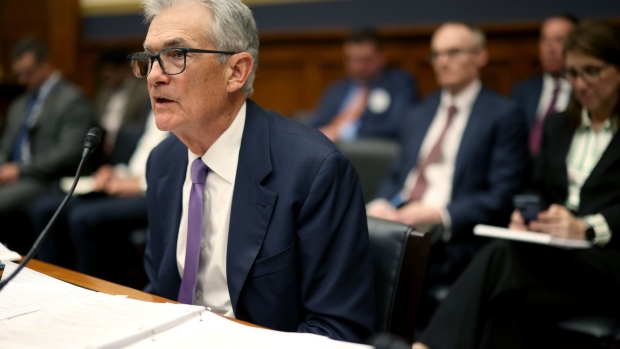Mar 6, 2024
Wall Street Gets Big Win as Powell Floats Scrapping Capital Plan
, Bloomberg News

(Bloomberg) -- Wall Street banks are on the cusp of a sweeping regulatory victory after Federal Reserve Chair Jerome Powell signaled officials would scale back plans to make them hold more capital.
The world’s most powerful central banker flatly told lawmakers Wednesday that the government’s plan was in for “broad and material changes,” and that a complete do-over was very possible. Powell’s comments appeared to catch even seasoned industry lobbyists off-guard and immediately threw into doubt a signature Biden-era regulatory effort.
Beyond the fate of the capital rule, Powell’s comments underscore the heft that the banking industry now holds in Washington more than a decade after it was blamed for the Global Financial Crisis. Industry groups have spent months waging a fierce lobbying campaign that’s featured appearances by chief executive officers, television spots during sports games and a barrage of comments submitted against the plan.
“It is unlike anything I have seen,” Powell told the House Financial Services Committee about the comment letters on the plan. Latham & Watkins, a law firm whose clients include banks, has said 97% of more than 300 comment letters raised substantial concerns with the entire plan or critical parts of it.
The proposal from the Fed, Federal Deposit Insurance Corp. and the Office of the Comptroller of the Currency is tied to the Basel III international overhaul that started more than a decade ago. Supporters have also been billed it as a fix for some of the issues exposed by the failures of Silicon Valley Bank and Signature Bank.
Final Plan
Michael Barr, the Fed’s vice chair for supervision, has been the face of the effort. Barr has said he’s open to changes, but has also defended the agencies’ initial approach as a way to ensure banks can withstand future crises. On Wednesday, Powell inserted himself into the fray with comments that immediately eclipsed his planned remarks on monetary policy and the state of the US economy.
Powell, Barr, and other senior Fed officials will need to vote on a final plan before the rules can take hold. The initial proposal cleared with an unusually close 4-2 vote, while Powell and Biden-appointee and Fed vice chair Philip Jefferson expressed reservations. The Fed chair decides when to put a measure before the central bank’s voting members, while the FDIC and OCC also need to approve a final version.
Ian Katz, a regulatory policy analyst at Capital Alpha Partners, said he was surprised by Powell’s blunt admission that the proposal could be redone. “The vice chair of supervision is supposed to drive the bus on regulatory and supervisory matters,” he said. “The truth is he drives the bus unless the chair and other members think he has gone too far off the main road.”
The heads of Wall Street’s biggest banks were in attack mode when they testified before the Senate Banking Committee in December. One by one, executives confidently told lawmakers their institutions were safe and that everyday Americans would ultimately pay the price if tougher rules are enacted.
Political Stakes
The political stakes are also high with November’s elections looming. A consolidation of power by Republicans, who have been generally receptive to the industry’s arguments, would further hamstring the effort.
Kathryn Judge, a professor at Columbia Law School who advised the Treasury Department’s Office of Financial Regulation during the Obama era, called Powell’s comments “disheartening.” She said that “modifying a rule in light of feedback is quite different than abandoning it entirely.”
Supporters of the July proposal say the beefed-up requirements called for in the plan would have minimal impacts on borrowing and that most lenders have enough capital to meet them. The industry looks set to break its own annual profit record in 2023 — a year that saw three of the four biggest bank failures ever.
Read More: Fed’s Michael Barr Is Open to Concessions on Bank Capital Rules
Under the July plan, the eight largest banks face about a 19% increase, with lenders between $100 billion and $250 billion in assets seeing as little as 5% more, government officials have said.
Not surprisingly, Powell’s comments were immediately cheered by banking-industry executives. Kevin Fromer, who leads the Financial Services Forum, said that his trade group was “encouraged” by the remarks. “Broad and material changes are needed to the proposal,” he said. “We continue to believe that a re-proposal is the best approach.”
©2024 Bloomberg L.P.





